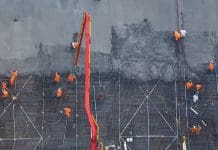Independent experts have warned of chronic industrial land shortage and inflated rent prices in the capital, in a new Industrial Land Commission report
Today’s Industrial Land Commission report finds that severe pressure on industrial land from housebuilding is detrimentally impacting businesses. Businesses are getting pushed out and forced to close. Any further loss could cause irreversible damage and the Commission is calling on urgent action to address London’s industrial land shortage, support businesses and protect jobs.
The Industrial Land Commission is chaired by leading property industry expert Liz Peace CBE. Peace is adamant that something must be done to protect London and other cities’ industrial land from further development. The report discovered that in the last 20 years, London has given up a quarter (24%) of its floorspace. In Greater Manchester and the West Midlands this figure is slightly less at one fifth (20% and 19% respectively) but just as concerning.
London risks damaging its economy and its ability to service the needs of the population
In London, this is the equivalent of 840 football pitches (6 million m2) lost between 2000/01 and 2020/21. Inner city London has been the worst affected with over 40% of its total industrial floorspace converted to other uses over the same period – areas worst affected include Hackney, (62%), Camden (52%) and Hammersmith and Fulham (51%).
London cannot afford to lose any more industrial land
The Commission has also considered how London will function as a city on the back of the industrial land loss. London’s size means that waste removal, delivery depots and repair and maintenance activities services must operate in or near the centre of the city, not just on the fringes and therefore this issue needs to be considered very seriously. It doesn’t help that there is fierce competition for the remaining industrial space – industrial site vacancy rates dropped to just four per cent in 2021, compared to 16% in 2001. Ultimately, London cannot afford to lose any more industrial land, argues the Commission.
Traditional industrial jobs in manufacturing, repair and warehousing are worth more than £78 billion to the capital’s economy, but the true figure is likely to be even higher as this excludes nonindustrial activities such as most creative industries. Now the number of jobs relying on industrial land has increased, and continues to rise.
The Commission proposes six solutions to battle London’s industrial land shortage:
1) Champion industrial spaces and improve representation: The Commission recommends that businesses set up an independent body to make the case for London’s industrial spaces, inform planning policy and raise the profile of industrial activities. It is advisable that the mayor of London appoints a powerful representative in City Hall for industrial land alongside supporting local authorities to upskill their staff working with industrial land.
2) Improve evidence about the supply and demand for industrial floorspace: London boroughs should develop in-depth analysis of their industrial land and real estate companies should make market data more accessible.
3) Enhance local planning, protection and flexibility: The mayor of London and London boroughs already have strong powers to retain industrial space through the planning system, but recent losses suggests that they have not been utilising this power. London boroughs urgently need to step in to ensure there is sufficient and suitable industrial accommodation on ‘their patch’.
4) Make better use of existing industrial land: The mayor of London and London boroughs should co-invest in developments that intensify remaining industrial land such as multi-storey warehouses.
5) Make co-location work: The mayor of London and London boroughs should subsidise developments that provide industrial floorspace in new locations where none currently exists.
6) Enhance strategic planning: The mayor of London and City Hall’s planners should be given as much as power as possible to devise London’s land use strategy, while national government’s role in approving it should be limited in scope.
The Industrial Land Commission was established to explore how London can make the best use of the remaining industrial land. The Commission met four times between March and October 2021 and was supported by a secretariat at Centre for London.
‘A potentially serious crisis for the city’
Liz Peace CBE, chair of the Industrial Land Commission, chairman of the Old Oak and Park Royal Development Corporation, and chair of Trustees at Centre for London said:
“London’s industrial land has long been unloved, misunderstood and often regarded as a relic of the past. Yet, and while they might not realise it, every Londoner, even those that never step onto an industrial park or into a factory, needs the services that take place in these spaces, from waste processors to mechanics, bakers to film makers.”
“The demand for homes in London clearly must be satisfied but sacrificing the city’s industrial land to meet that demand is short-sighted and ignores the need for jobs for the people living in those homes and for all those vital services required in a thriving city.
“The pressure on London’s industrial land represents a potentially serious crisis for the city. That’s why the Industrial Land Commission believes that the Mayor and London boroughs must do more to protect, intensify and provide new industrial spaces, while also championing the critical functions that industrial land enables in our city.”














